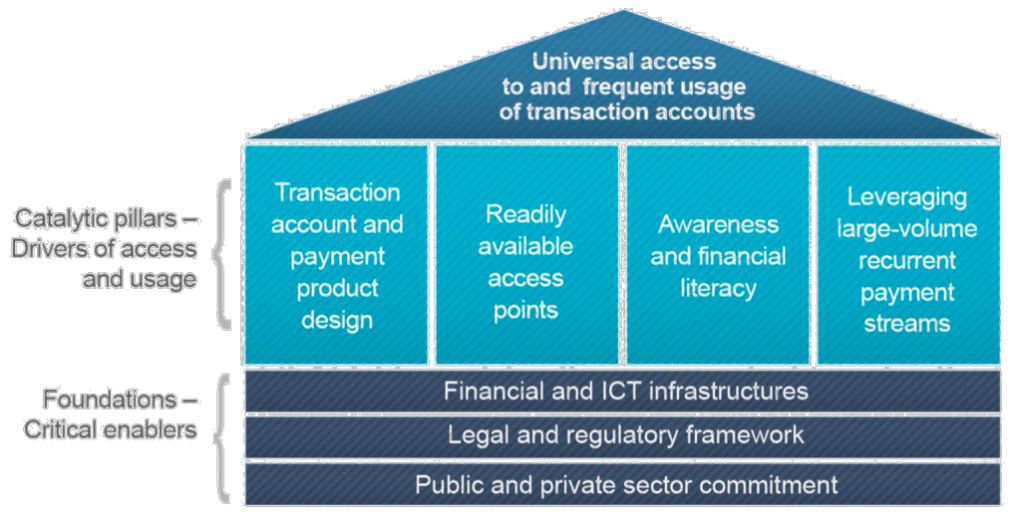The Committee on Payments and Market Infrastructures (CPMI) in Bank for International Settlements (BIS) and the World Bank published the Payment aspects of financial inclusion (PAFI) report in 2016. April 2020, the PAFI task force publishes additional reports for the fintech era.
From 2016 to 2020, fintech has made major inroads into payments and other financial services. It make transactions safe and encourage end-users to use it frequently. However it also arise some risks. The report addresses these issues. Here are sessions in the report.
“Payment aspects of financial inclusion” in 2016 report
The PAFI report envisages that all individuals and businesses have access to and use at least one transaction account1 operated by a regulated payment service provider (i) to perform most, if not all, of their payment needs; (ii) to safely store some value; and (iii) to serve as a gateway to other financial services. However, there are some barriers to transaction account access and usage. The PAFI address barriers in a framework (See the figure below.).
The framework includes comprising foundations (the critical enablers for payment systems and the provision of payment services) and catalytic pillars (the drivers of access and usage).

The report will address how fintech affect each element in the framework.
Fintech developments
The session overview some selected technologies, new payment products, and new access modes (See the figure below).

Opportunities and challenges of fintech developments in driving access to and usage of transaction accounts
The PAFI report identified four ”catalytic pillars” as drivers of access to and usage of transaction accounts. Some of the fintech developments in the previous session may boost or challenge these drivers.
- Transaction account and payment product design.
- Instant payments satisfy the demand for greater speed and end-user control
- Open banking has the potential to augment the usefulness of transaction accounts
- Digital ID simplifies customer due diligence
- The design of central bank digital currencies can aim at providing universal access to a basic means of payment
- Super apps cover a wide range of payment needs in their users’ daily lives
- Readily available access points
- New products and services change the demand for physical access points and cash
- Electronic wallets in combination with contactless technologies can expand the number of acceptance points at low cost
- Awareness and financial literacy
- End-users’ digital capabilities do not always keep pace with product evolution
- Big data analytics can break down knowledge barriers or reinforce exclusion patterns
- Leveraging large-volume recurrent payment streams
- Cross-border retail payments innovation can benefit from a mix of fintech developments
- Electronic wallets in combination with contactless technologies could support the efficient use of transaction accounts for transit payments
The role of the basic foundations in harnessing fintech’s opportunities while addressing the challenges
The PAFI report identified three foundations as critical enablers. These foundations can cater to fintech-specific issues.
- Public and private sector commitment
- Fintech developments call for increased international and cross-sectoral coordination between authorities
- A collaborative approach to fintech is key to making an impact
- Regulators’ initiatives such as sandboxes, innovation hubs, and innovation offices can foster the development of the fintech ecosystem
- Legal and regulatory framework
- Adapted and new licensing frameworks enable new players to leverage fintech for innovative services
- Data frameworks need to ensure privacy in the fintech era
- Fintech developments may challenge the applicability of current oversight concepts and standards
- Fintech developments should not compromise the effective protection of end-user funds
- Regulatory technologies can support authorities in fulfilling their supervisory and oversight tasks and market participants in meeting requirements more effectively and efficiently
- Financial and ICT infrastructures
- Fintech developments highlight the opportunities and challenges of non-bank access to payment infrastructures
- Fintech goes hand in hand with raising the bar for the cyber resilience of PSPs and financial infrastructures
- Interoperability and geographical coverage of financial infrastructures can benefit from fintech developments
Review of the PAFI guidance with focus on fintech
- Public and private sector commitment. Commitment from public and private sector organizations to broaden financial inclusion is explicit, strong, and sustained over time.
- Legal and regulatory framework. The legal and regulatory framework underpins financial inclusion by effectively addressing all relevant risks and by protecting consumers, while at the same time fostering innovation and competition.
- Financial and ICT infrastructures. Robust, safe, efficient and widely reachable financial and ICT infrastructures are effective for the provision of transaction accounts services, and also support the provision of broader financial services.
- Transaction account and payment product design. The transaction account and payment product offerings effectively meet a broad range of transaction needs of the target population, at little or no cost.
- Readily available access points. The usefulness of transaction accounts is augmented with a broad network of access points that also achieves wide geographical coverage, and by offering a variety of interoperable access channels.
- Awareness and financial literacy. Individuals gain knowledge, through awareness and financial literacy efforts, of the benefits of adopting transaction accounts, how to use those accounts effectively for payment and store-of-value purposes, and how to access other financial services.
- Large-volume, recurrent payment streams. Large-volume and recurrent payment streams, including remittances, are leveraged to advance financial inclusion objectives, namely by increasing the number of transaction accounts and stimulating the frequent usage of these accounts.
Read More
Libra Association Released White Paper Version 2 to Fit Regulations
G20 FSB Issued “10 High-Level Recommendations” for Global Stable Coin
Central Bank Digital Currency and the Future of Payment and Settlement Systems
